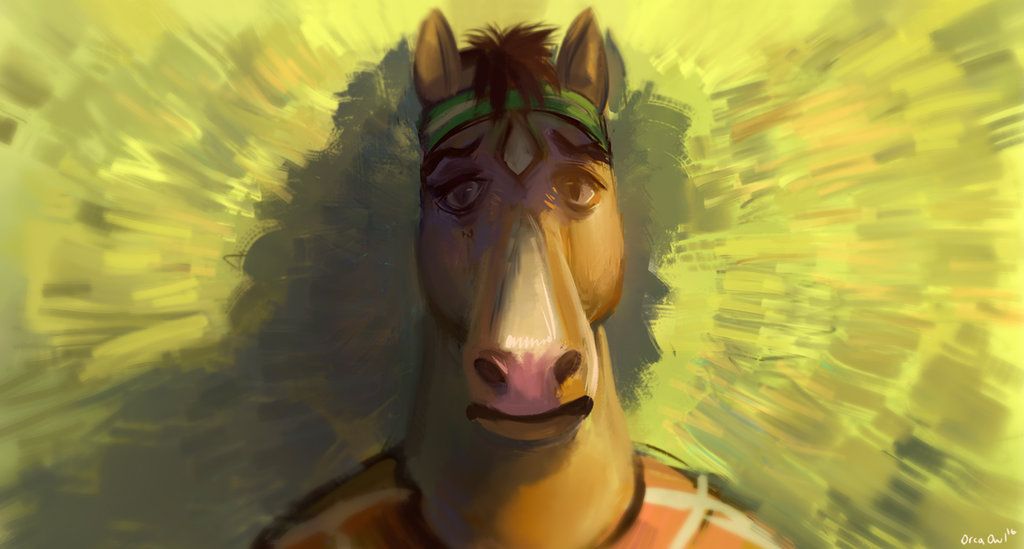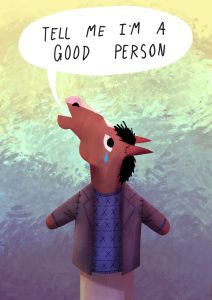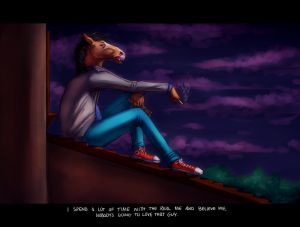
(EDITOR’S NOTE: Some names in this article have been altered for privacy reasons.)
More than meets the eye
“BoJack Horseman” has been labeled as one of the funniest, as well as most heartbreaking shows in recent history. Considering the show is about an animated talking horse, I was a bit skeptical at first.
As an animation junkie myself, I decided to give the show a chance. Upon first glance, I was not really liking what I was seeing.
Not to say it was horrible but it seemed to be a carbon copy of animated sitcoms like “Family Guy” and relied a bit too heavily on shock humor. I was somewhat ready to turn it off but I decided to continuing watching and see if it got any better.
What I got was far beyond anything I could have expected.
BoJack Horseman is a show about an anthropomorphic horse that starred on a sitcom in the ’90s called “Horsin’ Around.” Since then, BoJack is considered a “has been” and has taken alternative methods to coping with the loss of his fame, including alcohol and substance abuse as well as toxic, sexual relationships.

His inability to connect with other people, as well as his self-destructive behavior, drives him to continuously make bad decisions and push others away. Joining him are supporting characters such as his deadbeat roommate Todd, his workaholic agent Princess Carolyn, his sitcom rival Mr. Peanutbutter and his ghostwriter and closest friend Diane.
I did not even mention that half the characters are animals, while the other half are human. While a nonsensical idea, it is all the more effective when recognizing that these are some of the most human characters and situations in all of television.
What really strengthens “BoJack Horseman” and makes it rise above more other television shows I have seen is that it is one of the most accurate depictions of depression.
BoJack consistently wants to get better and believe that he is truly a good person deep down inside, but continuously sabotages himself and struggles to improve on his life. No matter how hard he tries, he always ends up repeatedly making bad decisions and losing close companions for good along the way.
As someone who has previously suffered from clinical depression, I can safely say that this is the most accurate and uncomfortable depiction of the mental illness that I have ever seen on television.
Wanting to get better but not knowing how to or what is causing your unhappiness, is a deeply relatable situation. I would constantly question myself if I was truly a good person and the more I thought about, the more I would get stuck in loops and turn to self-loathing, self-destructive attitudes and the belief that all hope is lost.
It is admittedly very heavy stuff, I myself had trouble getting through it because of how uncomfortable some of the scenarios are. These harsh perspectives at reality are so effective because of how realistically they are displayed, as well as the fact that anyone can go through the hardships, depressives states, losses and mundane aspects that life has to offer.
While it is one of the saddest shows on television, it also manages to be one of the funniest simultaneously. All of the main characters are funny, witty and charming, which is the reason we care so deeply about them when the meaning of their existence is in question.
BoJack’s Impact
The consulting producer of “BoJack Horseman,” Peter Knight, shed some light on why he thought the show is such a success with audiences. Knight explained that there was not a conscious focus on humor or drama with any given episode and that the two genres would often go hand-in-hand.
“I think the comedy and the drama are inseparable because even when we’re, [for example], at a funeral, you have something to laugh at, often some animal behavior riff or pun,” Knight said in an email conversation. “Pathos and humor are as close together in “BoJack” as a tree is to its bark, a unique feature of BoJack is that the comedy rarely just undercuts the drama or alleviates tension. It plays right next to the drama, working on two levels.”
Knight owes it to the creator of “BoJack,” Raphael Bob-Waksberg, for helping to improve his writing style.
“I have come to love and trust non-linear storytelling and Raphael is awfully good at conceiving of stories in unconventional ways,” Knight said. “In the wrong hands these can feel very gimmicky but I don’t think BoJack falls into that trap.”
Knight took note of how the success of “BoJack Horseman” comes from a handful of people who are drawn to suffering and the search for happiness. As fans spoke out, it seemed that was partially correct.
Derek Jelsma, a fan of the series who claims that he has developed a bit of an obsession with the show, is currently rewatching the show for the eighth time.
“The show definitely clicks with me a lot, especially as someone who suffers from depression,” Jelsma said. “I definitely love that every character suffers in their own unique way, it’s so diverse and, above all, painfully accurate in its portrayal of depression.”
The central character, BoJack Horseman himself, is one that Jelsma finds himself relating to the most.
“I’ve never been a partier or anything, always been ‘straight edge,’ but I definitely struggle to relate to people often, and I absolutely want everyone to like me,” Jelsma said.
Jelsma also relates the connection between him and his ex-wife to the connection between Horseman and his agent, Princess Carolyn. BoJack constantly uses Princess Carolyn for his own sexual desires, yet tries to have a professional relationship with her as an agent and takes her caring for granted, which typically ends in disaster.
“I just got divorced, and although it was mostly friendly, I definitely had to learn to become independent and I realized just how much I had let my ex-wife mother me over the years,” Jelsma said. “She took care of my bills, helped me clean and cook, always found us new apartments when we needed to move and just generally took care of things like that. I’m doing much better now, but still, I definitely took advantage of her and I feel awful for it.”
Louise Mosqueda, an SEO Content Specialist, also relates her connection to the titular character to a similar break-up she experienced.
“I was going through a pretty bad breakup when I first started watching the show and I was feeling a lot like BoJack,” Mosqueda said. “Destructive, trying to help myself and failing and just wallowing in self-pity.”
Mosqueda pinpoints that her favorite part of “BoJack” would simply be how it reflects adult life in general, including the fears and struggles of everyday life.
“It shows how everyone is handling these struggles, suggesting ways on how to improve yourself but also showing how it could fail and how it isn’t all that easy,” Mosqueda said. “That there’s a struggle greater than that and there always will be.”
Some people find themselves connecting with different characters from the series. Sarah Lynn, one of the tertiary characters from “BoJack,” was a child actress who starred on “Horsin’ Around” in the 90’s and grew up to be a drug-addicted pop star.

Sarah Lynn’s destructive life stems from the fact that she was never able to have a normal childhood. Those with addictions have found themselves able to relate to her behavior as well, especially Emma Lloyd, another fan of the show who spoke of her own past demons.
“My childhood was full of traumas and those traumas have influenced my relationships with other people,” Lloyd said. “I identify with Sarah Lynn, not because I was famous or anything, but because of her addiction problems and how they stemmed from childhood. How when you get clean you’re still kinda always looking for an excuse to go back because it’s all you know.”
The show has not only connected with adult audiences, however. Bethany Conner, a freshman in high school, finds herself relating mostly to the character of Mr. Peanutbutter.
Mr. Peanutbutter is the least outward with his emotions throughout the series and consistently hides his issues through his exaggerated happiness and wacky projects. Conner can sympathize with this, as her own struggles with mental illness have led her to make similar life choices.
“I am awful at expressing my true emotions and I try to just be a “good boy/girl” and be happy,” Conner said. “I resonate with Mr. Peanutbutter’s rejection of emotions, problems in relationships and his attempt to always be happy and spread happiness.”
BoJack’s Future
The season three finale left off with BoJack at his lowest point and all of the relationships he has built over the years are falling apart. Several of these fans are looking forward to what “BoJack Horseman” has in store for its upcoming fourth season, which will premiere on Netflix during the summer of 2017.
“I want to be surprised,” Mosqueda said. “However, I am hoping for BoJack to find something to live for.”
Jelsma also hopes for optimism in BoJack’s future and would be disappointed if the show took BoJack’s deterioration of life any further.
“BoJack definitely has a want to get better, he just doesn’t know how without assistance,” Jelsma said. “I hope he finds something to help him better himself, because he did have a rough time growing up how he did and he does deserve a second chance, no matter how awful he was in the past.”
“In the fourth season I hope to have some sort of closure,” Conner said. I feel there needs to be some closure for certain earlier conflicts and some questions to leave us still loving to watch Bojack even after it ends.”
Knight spoke very vaguely about the upcoming season and tried to spoil as little as possible.
“Expect more of what makes it interesting and provocative,” Knight said.
Editor’s note: Princess Carolyn was mistakenly referred to as BoJack’s secretary, rather than his agent, in earlier revisions. This was fixed for accuracy.



Princess Carolyn is BoJack’s agent not his secretary.
This was beautiful. Thank you.